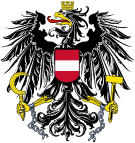
| This article is part of a series on the |
| Politics of Austria |
|---|
 |
In Austrian constitutional law, a supreme executive organ (German: oberstes Verwaltungsorgan), is an elected official, political appointee, or collegiate body with ultimate responsibility for a certain class of administrative decisions – either decisions in some specific area of public administration or decisions of some specific type. The president, for example, is the supreme executive organ with regards to appointing judges; the minister of justice is the supreme executive organ with regards to running the prosecution service; the president of the Constitutional Court is the supreme executive organ with regards to the operational management of the Constitutional Court. The Constitutional Court itself, on the other hand, is not a supreme organ because its decisions, while definitive, are judicial and not administrative in nature.
Although supreme executive organs, by definition, cannot be overruled by any other person or institution in the executive branch, the constitution still means for them to be politically answerable to the officials, institutions, or electorates that have installed them. The president, for instance, is elected by the people and can be recalled by the people; the chancellor is appointed by the president and can be dismissed by the president; governors are elected by provincial legislatures and can be removed by provincial legislatures. Most supreme executive organs can also be impeached or removed through parliamentary motions of no confidence.
© MMXXIII Rich X Search. We shall prevail. All rights reserved. Rich X Search


